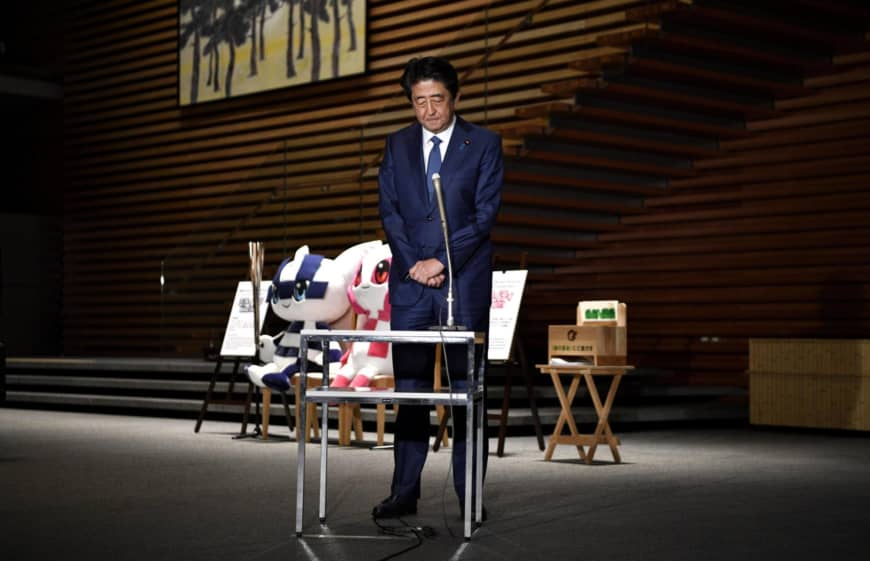Prime Minister Shinzo Abe on Monday evening justified extending the state of emergency nationwide until May 31 but vowed to gradually relax some restrictions to resuscitate the economy.
Abe, holding a news conference, showed a dose of cautious optimism that the number of coronavirus patients is on a downward slope as he claimed the emergency declaration has been effective and thanked the public for cooperating.
At the same time, he said the situation remains grim, pointing out that the number of patients in critical condition requiring a ventilator has tripled in the last month and nearly 10,000 patients are still undergoing treatment, including hospitalization.
“We determined that one month will be necessary to improve the strained health care system by keeping the number of new patients low while facilitating more patients to be discharged,” Abe said, laying out the rationale for extending the emergency declaration.
He added that he wants experts to reassess the state of regional infections nationwide, as well as how far medical facilities are stretched, and decide whether it’s possible to lift the declaration before the end of the month.
The extension reflects somber assessments by government officials and disease experts that Japan has not yet contained the pandemic, with daily infection counts staying high and medical resources stretched thin.
Noting the emergency declaration was set to expire on Wednesday, the officials said keeping the restrictions in place was inevitable because easing them might send infections soaring again and render the mild progress achieved so far meaningless.
Nationwide, more than 15,000 people have developed COVID-19, the respiratory illness caused by the coronavirus, and about 530 people have died from it. The actual figure for infections is estimated to be much higher due to Japan’s limited approach to testing and the virus’s knack for asymptomatic transmission.
An advisory council composed of ministers and members of the government’s coronavirus panel agreed to push the deadline for the declaration beyond next week, a procedure specified in the special measures law. The panel recommended last week that the measures be kept in place.
The prime minister declared a state of emergency in seven prefectures on April 7 and expanded it nationwide on April 16. Abe said at that time that the government feared a mass movement of people ahead of and during the Golden Week holidays would spread the virus more and exacerbate the situation.
Whether to call off the emergency declaration will depend on each prefecture’s situation and the soundness of their health care systems.
Coinciding with the extension, the government will revise its guidelines for resuming economic and social activities while maintaining public health. By lifting some restrictions, the government hopes to placate public unease with the sustained economic damage being caused by the protracted crisis.
The prime minister argued actions to prevent catching the virus need to be kept in place but also need to slowly bring back the regular economic activities.
“The coming month is one where we will aim to resolve the state of emergency and view it as a preparatory period toward the next step,” Abe said. “We must be resolved that it’s going to be a long battle. But if we continue current measures that severely restrict the economic and social activities, we can no longer make ends meet. We need to build a new normal as soon as possible in the times of the coronavirus to protect our lives.”
Under the revised guidelines, strict measures — such as refraining from going out for nonessential tasks and temporarily closing businesses — will stay in place in 13 prefectures the government has designated as having a particularly high number of patients.
The government’s request to slash face-to-face contact by 80 percent in those prefectures, which include Tokyo, Osaka, Aichi, Hokkaido, Kyoto and Hyogo, will stay in effect. But public facilities such as parks and museums might be allowed to reopen as long as sufficient social distancing measures are in place and the facilities are thoroughly disinfected.
In the rest of the prefectures, the government will still request that the public avoid cross-prefectural travel but will relax some of its rigid standards.
The revision also calls for adopting what the government calls a “new lifestyle” plan that incorporates social distancing and avoiding crowded areas where the virus can be transmitted easily.
According to published reports about the plan, people are advised to wear masks while outside, keep two meters away from others, wash hands frequently with soap and water, change clothes upon returning home, and keep track of the people they’ve met in case they get infected and need to help trace the infection route.
Other steps include refraining from speaking on public transportation, sitting side by side while eating instead of across from someone else, using e-commerce and conducting business meetings online.
During the news conference, Abe pledged to expand virus testing and increase domestic production as well as imports of personal protective equipment for health care professionals.
The prime minister revealed Avigan, one of the medicines seen effective in COVID-19 treatment, has been prescribed in nearly 3,000 cases and said the government aims to approve the drug by this month.
